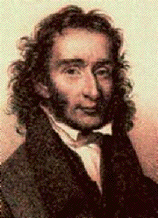October 27: Niccolò Paganini
Niccolò Paganini (1782)
It was on this date, October 27, 1782, that Italian virtuoso violinist and composer Niccolò Paganini was born in Genoa. Like Mozart, who was born 26 years earlier, Paganini was a child prodigy, composing a sonata at age eight and performing onstage from the age of eleven. He learned much from his father and studied composition with masters in Parma.
He toured and captivated Vienna in 1828 and made admirers of Goethe, Heine and Schumann on his equally successful tour in Germany. Paganini went on to conquer Paris and London. During his concert career, it was rumored that his mesmerizing virtuosity was a gift from the devil – a rumor Paganini did nothing to discourage! Very few of his compositions were published during his lifetime, which helped to stymie imitators. As for the inimitable technique that drew audiences in droves, the Grove Dictionary says,
Apart from his unparalleled technical wizardry on the instrument, including the use of left-hand pizzicato, double-stop harmonics, ricochet bowings and a generally daredevil approach to performance – all of which influenced successive violinists (Ernst, Bériot, Vieuxtemps) – he is most important for his artistic impact on Liszt, Chopin, Schumann and Berlioz, who took up his technical challenge in the search for greater expression in their own works.
Sadly, Paganini's international touring schedule crushed his health by 1834. He announced his retirement in 1835, but later lost his voice. Niccolò Paganini finally died from cancer of the larynx, in Nice, on 27 May 1840. He was 57.
His principal biographer, the orthodox Catholic Count Conestabile,* admits only that Paganini practiced "religious indifferentism." Paganini received no last sacrament nor any religious service at his funeral, and his burial was non-religious. At least in Italy, Paganini was well known as "an Atheist."
* Gian Carlo Conestabile, Vita di Niccolò Paganini, 1851, p. 186.
Originally published October 2003 by Ronald Bruce Meyer.


